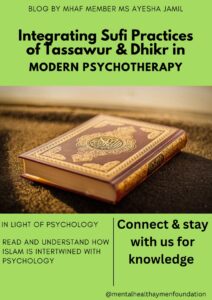Integrating Sufi practices of Tassawur and Dhikr in Modern Psychotherapy

Integrating Sufi practices of Tassawur and Dhikr in Modern Psychotherapy
The stage in Sufi practice known as Tasawwur is the practice of concentrating on the visualization of God, Prophet Muhammad or the shaikh [spiritual guide]. Traditionally, this stage was designed to foster a relationship with the divine, though in the current context, especially within a therapeutic practice, this method has been used. For example, the salik might think of light passing through their body instead of thinking of the shape of the shaikh. The practice involves absorption or dying in relation to the shaikh, the prophet, the Quran and finally in Allah through the stages of Fana fi Shaikh, Fana fi Rasul, Fana fi Qur’an and lastly, Fana fillah’.
In modern Islam, this concept is similar to cognitive practices based on such counterparts as a therapist who guides a patient as a Sufi master happens to do. The client has conflicts that are emotional and psychological and the therapist assists the client to deal with them much in a similar way that a shaikh assists disciples. Such therapeutic relationships ensure clients challenge and approach their psychological content inclusively, including negative affect.
Another form of process in muraqaba is the Dhikr or divine remembrance. And this includes the recitation of mantras or sacred word or phrase, combined with the prescribed gestures, such as deep breathing and prayer. In clinical situations, the technique known as dhikr is religious and beneficial to the patient’s health. Remembrance or recollection of the divine prepares the heart and emotions for the earthly qualities of the divine character, therefore giving tranquility. Ibn Arabi and al-Ghazali have suggested that Recollection is dialogue with God resolving the lover; it assists the performer in gaining improved spiritual ability and saves him/her from mental anguish.
Therefore, Tasawwur and Dhikr are fundamental components of Sufism, while these modified into psychotherapy serve as a way to sociocultural wellness representation through penance of imagination and invocation of the divine.
